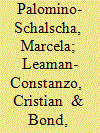|
|
|
Sort Order |
|
|
|
Items / Page
|
|
|
|
|
|
|
| Srl | Item |
| 1 |
ID:
144271


|
|
|
|
|
| Summary/Abstract |
The way that water is entangled with broader social relations has become a prominent concern in political ecology, geography and beyond. Employing the concept of the hydro-social cycle highlights how water is produced by, and simultaneously constitutes, social and power relations. Applying and expanding the hydro-social cycle as an analytical lens, this paper explores the contestation of different discourses of water. Looking at the conflict over the construction of a proposed dam in Chile, we examine different meanings given to water to understand how these produce uneven power relations with material and symbolic implications. By teasing out the workings and contestations of this conflict as a hydro-social cycle, we aim to highlight the diverse range of elements enlisted in it beyond water, to expose its complexity and to search for more just and inclusive alternatives.
|
|
|
|
|
|
|
|
|
|
|
|
|
|
|
|
| 2 |
ID:
174838


|
|
|
|
|
| Summary/Abstract |
This article explores the relationship between I‐Kiribati communities and the broader ‘imagined’ Pasifika community in Aotearoa New Zealand. It looks at the way a group of I‐Kiribati tertiary students experience identity within this context. Through the use of semi‐structured interviews and a discourse analysis, the study draws three main conclusions. First, that I‐Kiribati navigate multiple identities and are constantly negotiating these within different spaces. Although this contributes to uncertainties around identity, I‐Kiribati students also strategically enact identity to suit various contexts. Second, that Pasifika as a term tends to infer ‘Polynesian’ which in turn may marginalise I‐Kiribati identities within certain spaces, particularly in education settings that intend to support all Pacific identities. Yet, given such a narrow understanding of Pasifika, these efforts may counter that intention for those on the margins of, or outside the common usage of, the term Pasifika. Last, community plays a significant role in the formation of identities within minority groups, which is important for countering aspects of marginalisation experienced within broader pan‐ethnic labels such as Pasifika. Consequently, we argue that Pasifika as a label needs to better reflect inter‐Pacific diversity as well as the identity negotiations that Aotearoa New Zealand‐born Pacific peoples navigate.
|
|
|
|
|
|
|
|
|
|
|
|
|
|
|
|
|
|
|
|
|